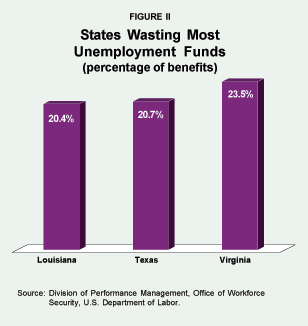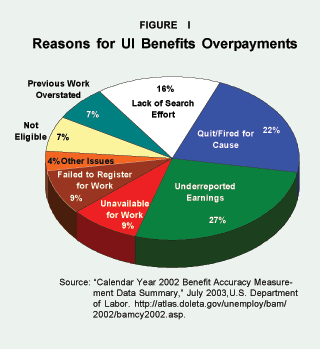The Unemployment Insurance (UI) system erroneously pays billions of dollars to people who do not qualify. These overpayments equaled 9 percent, or $3.7 billion, of the $41 billion paid to laid-off workers in 2002, according to audit results recently issued by the U. S. Department of Labor. The fundamental problem is that we accept a high level of overpayments as a routine cost of doing business, rather than treating it as excessive waste that must be stopped.
Overpayments Are a Pervasive Problem.
Overpayment of benefits is persistently high:
- Over the last 15 years, the overpayment rate has ranged from 7.5 percent to 10.1 percent.
- Last year's overpayments of 9.1 percent were above average and above the previous two years' levels, indicating that we are making no progress in reducing them.
- Persistent bias in the program is obvious because benefit underpayments average just 0.7 percent.
Every state has an overpayments problem. Even the track record of the three states with the best performance is nothing to be proud of: Vermont, Massachusetts and Oklahoma still overpay more than 1.7 percent of their total benefits.See Figure (PDF)
The states with the worse worst problems are incredibly bad. Virginia, Texas and Louisiana all have overpayment rates in excess of 20 percent – more than one of every five dollars paid in benefits goes to someone who does not qualify. See Figure.
Causes of Overpayments.
The overpayment problem has multiple causes. The Labor Department audit found that more than half of the overpayments were due solely to claimants' errors. See Figure.
The failure of beneficiaries to report earnings while receiving benefits accounts for more overpayments (27 percent) than any other single cause. Most state employment departments have difficulty preventing or recovering these overpayments. Prevention is difficult because of the long delay between a person's reemployment and the state's awareness of it. States usually learn of the overpayment from employee Social Security numbers listed on the new employer's quarterly UI tax filing. However, the report may be filed two or three months after reemployment, and the state may then delay cross-checking for UI claimants.
Recovery of overpayments is difficult because claimants have already spent them in most cases and have no fat bank account to tap. States are reluctant to press criminal charges, even though the claimants have been filing false weekly reports asserting their unemployment.
The best hope for reducing this source of overpayments lies in the new hires databases that were established to look for people owing unpaid child support. Employment departments can access their own state databases, although not all do; but state databases do not cover federal employees, workers with out-of-state jobs or employees of some multistate companies. The Bush administration has proposed giving states access to the comprehensive federal database, but Congress has not yet authorized it. Under-the-counter earnings also contribute to the overpayment problem, but they are unlikely to be identified in the benefit audits. Thus, the 9.1 percent national overpayment rate understates the extent of the problem.

The next largest category of causes of overpayments relates to the job separation (22 percent). In most states, a person who quits or is fired for cause must wait several weeks before becoming eligible for UI benefits. However, a person's benefits may begin before the former employer has a chance to explain that the separation was not a layoff. Some employers may not contest claims, especially if the employer is already paying the maximum UI tax rate. (Once an employer reaches the maximum rate, additional claims do not increase the experience-rated UI tax it pays.)
Every claimant has a one-week waiting period for benefit eligibility, during which the reason for the separation should be clarified by the employer. Given our information technology, information about the reason for termination should be able to move from an employer to the state within a week.
A third major reason for overpayments is failure to look for work (16 percent). Program auditors typically ask UI claimants about their work skills and job search activities, and may check with employers to confirm that they did, in fact, apply for work. However, a Labor Department memorandum to state employment agencies states that "Failure to meet work search requirements cannot be detected cost-effectively." In effect, UI is run on the honor system, with disastrous consequences.
Certainly, some people embellish their actual search efforts when talking to a state investigator. In at least some states, the evaluation of a person's work search is very subjective. In Oregon, for instance, auditors have no formal criteria. They listen to what a claimant says about his or her efforts to find work, then take into consideration the job market for a person with the claimant's skills and experience, and finally decide whether that person is doing what a prudent person would do to look for work. The lack of standards means that a sympathetic investigator might find few cases of insufficient job search activity. Varying standards also make state-to-state comparisons difficult.
There are other obstacles to reducing overpayments. The first priority of some state officials is to get money into claimants' hands quickly, even at the expense of large overpayments. A further challenge is the "two-bucket" problem. Funds for benefits are separate from funds to administer the system. Once administrative funds are used up, there are no more dollars to spend, even if there are potential savings in benefit overpayments. Thus, an idea that might prevent five dollars of overpayments for each additional dollar spent administratively might not be implemented. President Bush has proposed consolidation of the two accounts, but Congress has not acted.
Workers Pay for Overpayments.
Unemployment benefits are funded by a tax on employment. Economists have found that the average amount of the tax is passed on to workers through lower wages. Thus, overpayments come out of the paychecks of working people and go to people who don't qualify.
Overpayments also exacerbate the disincentives to work created by the current UI system. Academic researchers have discovered that people take longer to find jobs when they are receiving benefits, and the more generous the benefits, the longer they are out of work. Also, paying people who have voluntarily quit or who are not looking for work discourages employment.
Conclusion.
Unemployment benefit overpayments are conservatively estimated at $3.7 billion, compared with only $3.0 billion spent to administer the system. It is clear that we need a national commitment to clean up the waste.
Bill Conerly is a senior fellow with the National Center for Policy Analysis and an economic consultant. He can be reached at Bill@ConerlyConsulting.com.